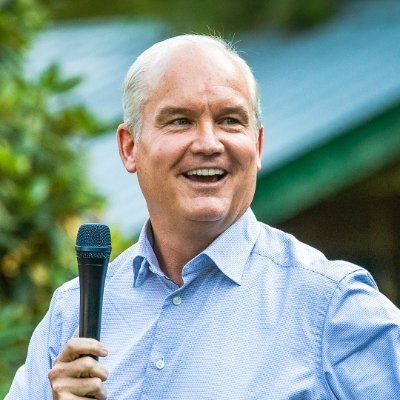CONSERVATIVE Party Leader Erin O’Toole on Thursday announced his plan to tackle the housing crisis by building a million homes over the next three years and stopping foreign money from pushing up home prices.
“We have a housing crisis in Canada,” said O’Toole. “The supply of homes – to own as well as to rent – is not keeping up with our growing population and too many foreign investors are sitting on properties as investments. As Prime Minister, I will ensure we build and make more affordable housing options available for Canadians first.”
With Canada’s Recovery Plan, Canada’s Conservatives will increase the rate of home construction to build a million homes over the next three years and make homes more affordable by:
- Reviewing the extensive real estate portfolio of the federal government – the largest property owner in the country with over 37,000 buildings – and releasing at least 15 per cent for homes.
- Requiring municipalities receiving federal funding for public transit to increase density near the funded transit.
- Encouraging Canadians to invest in rental homes by allowing the deferral of capital gains tax when selling a rental property.
- Banning foreign investors from buying homes here if they are not planning to live in or move to Canada.
- Encouraging foreign investment in affordable purpose-built rental housing for Canadians.
- Providing more Canadians with a path to homeownership by making it easier for more families to get a mortgage.
- Being a reliable partner in addressing the housing needs of Indigenous communities and will implement a ‘For Indigenous, By Indigenous’ home strategy.
“If you and your loved ones can afford to ignore the housing crisis, you have three parties to choose from,” O’Toole said. “But if you want your government to secure a future where you and your family can afford a home that meets your needs, you have one choice: Canada’s Conservatives.”
Backgrounder: Tackling Home Prices
Increasing Housing Supply
Canada’s Recovery Plan will build one million homes over the next three years.
To accomplish this, a Conservative government will ensure more housing is built closer to transit. It will leverage federal infrastructure investments to build more integrated, mixed-use communities that are connected to transit stations to help create jobs, reduce congestion, and reduce emissions. It will also require municipalities receiving federal funding for public transit to increase density near the funded transit.
Currently, the federal government is the largest real estate owner in the country with a portfolio of over 37,000 buildings. Yet every year, they pay millions of dollars in taxpayer money to keep up empty buildings in their care. Canada’s Conservatives will review this extensive portfolio with the goal of releasing at least 15 per cent for housing and ending this drain on taxpayer funds.
To increase the supply of rental housing, a Conservative government will extend the ability of Canadians to defer capital gains tax when selling a rental property and reinvest that money in rental housing, something that is currently excluded. Conservatives will also work with the private sector to explore converting unneeded office space to housing.
As part of our commitment to reconciliation with Indigenous peoples, Canada’s Conservatives will enact a “For Indigenous, By Indigenous” strategy. This approach has long been called for by Indigenous housing advocates and will empower Canada’s Indigenous communities to meet their own housing needs, and end the federal government’s paternalistic approach to housing.
Community Land Trusts are nonprofit, community-based organizations designed to ensure community stewardship of land. However, they are often underutilized when it comes to ensuring the availability of affordable housing for residents who might otherwise be priced out of the market. A Conservative government will enhance the viability of using Community Land Trusts for affordable housing by creating an incentive for corporations and private landowners to donate property to these land trusts for the development of affordable housing. The incentive will mirror the provision which exists for donating land to ecological reserves.
Getting Crime Out of the Business of Real Estate
All too often, corrupt activities drive up real estate prices and put homeownership out of reach for Canadians. As part of Canada’s Recovery Plan, Canada’s Conservatives will implement comprehensive changes to the Proceeds of Crime (Money Laundering) and Terrorist Financing Act, and give FINTRAC, law enforcement, and prosecutors the tools necessary to identify, halt, and prosecute money laundering in Canadian real estate markets.
A Conservative government will establish a federal Beneficial Ownership Registry for residential property so ownership is more transparent. Designating a “beneficial owner” identifies the real person, and not a corporate entity, that ultimately owns, controls or benefits from the asset. Information from a Beneficial Ownership Registry can be used to prevent the abuse of corporate vehicles for money laundering or other criminal purposes.
Further, Canada’s Conservatives will recognize the important work done by the Commission of Inquiry into Money Laundering in British Columbia. Conservatives will closely examine their findings and recommendations, and quickly implement recommendations at the federal level.
Redirecting Foreign Investment
Too many homes are sitting empty as investments, preventing Canadians and their families from finding the home of their dreams.
To stop and reverse the inflationary impacts of foreign investors and speculation in the housing market, a Conservative government will ensure that housing in Canada is truly for Canadian citizens and residents first.
To stop homes from sitting vacant, Canada’s Conservatives will ban foreign investors not living in or moving to Canada from buying homes here for a two-year period, after which this policy will be reviewed.
Foreign investment does have an important role to play in driving our economy and funding more housing. A Conservative government will help channel and encourage foreign investment in purpose-built rental housing that is affordable to Canadians.
Making Mortgages More Affordable
Canada’s Conservatives will encourage a new market in seven to 10-year mortgages to provide stability both for first-time home buyers and lenders, opening another secure path to homeownership for Canadians, and reducing the need for mortgage stress tests.
A Conservative government will also remove the requirement to conduct a stress test when a homeowner renews a mortgage with another lender instead of only when staying with their current lender, as is the case today. This will increase competition and help homeowners access more affordable options.
Canada’s Conservatives will increase the limit on eligibility for mortgage insurance and index it to home price inflation, allowing those in high-priced real estate markets with less than a 20 per cent down-payment an opportunity at home ownership.
Finally, a Conservative government will fix the mortgage stress test to stop discriminating against small business owners, contractors, and other non-permanent employees including casual workers.
Canada’s Conservatives will never tax Canadians’ capital gains on the sale of their principal residence, something many within the Liberal party are threatening to do.
Quick Facts
- The national average sale price for housing reached $662,000 in July 2021, up 15.6 per cent from July of last year.
- According to StatsCan, as of June 2021, new home prices were up in all 27 census metropolitan areas (CMAs) on an annual basis, with the largest increases in Kitchener–Cambridge–Waterloo (+27.7%), Ottawa (+26.2%), Windsor (+22.8%) and Montréal (+19.9%). These are the largest annual accelerations for these four CMAs since the beginning of the New Housing Price Index in February 1981.
- According to an August report by the National Bank of Canada, housing affordability has worsened by the most in 27 years and affordability deteriorated in 10 of Canada’s urban centres.












